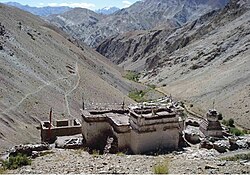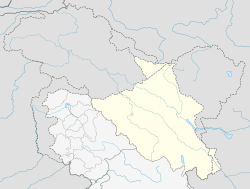Sumda Chun
This article includes a list of general references, but it lacks sufficient corresponding inline citations. (August 2017) |
Sumda Chun | |
|---|---|
 The temple at Sumda Chun - verso | |
| Coordinates: 34°8′0.93″N 77°9′2.73″E / 34.1335917°N 77.1507583°E |



Temple at Sumda Chun, an early Tibetan Buddhist temple and monastery is located in the Sumda Chun village, on northwest edge of Leh in Himalayas in Ladakh, India.
The temple at Sumda Chun is under the management of Hemis Monastery that appoints monks for conducting daily rituals and takes care of any major intervention in the temple. Temple which was originally part of a Gompa that existed at Sumda Chun has been attributed to the period of Lotsawa Rinchen Zangpo (957-1055),[1] and is believed to be one of the three temples founded by him in one night along with those at Alchi Monastery and Mangyu. This faith of the Buddhists puts this temple at a very important status thereby placing it in the Sumda-Mangyu-Alchi pilgrimage track that the pilgrims try to do in a single day.[2] Sumda Chun village is at a height of 3500 metres from the sea level and is accessible by road since 2019. Sumda Chun village lived in darkness till August 2017 with no electricity before the village and monastery were electrified by Global Himalayan Expedition team in August 2017. The population of about 120 people staying in the village also contributes an active part in the day by day activities of the temple in the form of offerings to the temple and manpower for its maintenance.
The temple is listed as one of the 100 most endangered sites in World Monument Funds 2006 Watch List
Access
Sumda Chun Monastery is around 65 km to the southwest of Leh, which is connected by a motorable road, up to Sumdo. The track starts ascending to the west, through a gorge from the left bank of the stream. At one point, the track crosses to the right bank and ascent becomes little more difficult. One or two houses come in the way before another gorge appears on the right which leads to the Sumda chon Monastery and towards the left leads to Sumda Chenmo. This track goes along the stream with plantations of Willow. After walking for an hour the monastery appears above the village houses. There is another short track from Alchi village through Stakspila, the ascent from Alchi is more difficult and long compare to Sumda side.
Conservation
5 year program of architectural conservation and conservation of artworks in the temple that include paintings and sculptures in the shrine was carried out by Namgyal Institute for Research on Ladakhi Art and Culture and the conservation. The conservation program was funded by the World Monuments Fund.[3][4] The conservation project of Sumda Chun was awarded "Award of excellence" by UNESCO Asia-Pacific Awards for Cultural Heritage Conservation in the year 2011. Award citation reads as follows
Sumda Chun Gonpa, Ladakh, India
The heroic rescue of the Sumda Chun Gonpa has brought back to life one of the oldest monasteries in a remote area of Ladakh. The restoration of the historically significant but severely dilapidated structure was carried out in a systematic and sensitive manner guided by meticulous research. Conservation interventions combined world-class scientific methods with vernacular building know-how. The art conservation is particularly notable for its sophistication. The exemplary project was realized through the steadfast commitment of the local community and the monastic order, in cooperation with cultural foundations and international partners.
A unique painted chorten of the temple complex dating to 13th century was conserved by M/s. Art Conservation Solutions in collaboration with Himalayan Cultural Heritage Foundation, conservation project was again funded by World Monuments Fund in August 2013.[5]
See also
References
- ^ "Sumda Chung". bks.tugraz.at. Retrieved 26 January 2020.
- ^ "Sumda Chun Monastery". World Monuments Fund. Retrieved 26 January 2020.
- ^ "SUMDA CHUN MONASTERY | World Monuments Fund". Wmf.org. 1 April 2010. Retrieved 26 June 2010.
- ^ "Conservation at Sumda Chun, India | World Monuments Fund". Wmf.org. Retrieved 26 June 2010.
- ^ "Conservation of the Painted Chorten at Sumda Chun, Ladakh, India; World Monuments Fund". Wmf.org. 14 December 2013. Retrieved 14 December 2013.
- ^ "Ladakh Monastery". Reachladakh.com. Retrieved 26 August 2017.
- ^ "Sumda Chung". Archresearch.tugraz.at. Retrieved 26 August 2017.
- ^ Luczanits, Christian (26 August 2017). Buddhist sculpture in clay: early western Himalayan art, late 10th to early 13th centuries. Serindia Publications, Incorporated. ISBN 9781932476026. Retrieved 26 August 2017 – via Google Books.

